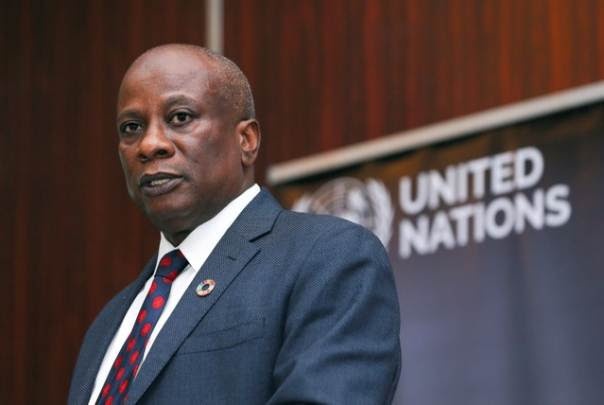People Of Northeast Key To Ending Boko Haram Insurgency – UN Humanitarian Coordinator
The UN Humanitarian Coordinator, who is coming to the end of the tenure, said Northeast residents are important stakeholders in ending the conflict.

Edward Kallon, the United Nations Humanitarian Coordinator in Nigeria, says neither the government nor the military can end the conflict in Northeast Nigeria without the will and support of the people of the region.
Kallon who heads Nigeria’s UN office for the coordination of Humanitarian Affairs (UNOCHA) said this at a function in Maiduguri, Borno State capital.
The veteran Sierra Leonean humanitarian who has been in Nigeria for nearly five years and has almost come to the end of his stay in the country, said he “can’t understand” the nature of the Boko Haram crisis.”
“I was in Geneva recently and was talking to experts; I said I have been in the country for some time studying this crisis, and I don’t understand it,” Kallon remarked while delivering a goodwill message at the recent handing over of 1000 units of houses by the Northeast Development Commission (NEDC) to Borno IDPs.
“But I have come to conclude that if the people of the Northeast region want this to stop, it will stop.”
He said the people of Borno state and Northeast Nigeria where Boko Haram has its strong base “don’t have to wait for the government.”
He emphasised that no amount of kinetic and non-kinetic approach to ending the Boko Haram conflict would succeed if the people don’t express their resolve that it has to end.
Kallon further disclosed that even as his tenure is fast winding up as the head of UN mission in Nigeria, his concerns over worsening insecurity and food crisis in Northeast, have been assuaged by the recent radical policies of the government on the management of the crisis.
“What I am seeing here today is what I have described in my memoirs that I have been writing as improvement in the national leadership and ownership.”
“Let me give a few examples of National leadership and ownership. When we came to support the efforts of the government there were a series of challenges in coordinating the response in Northeast Nigeria,” Kallon said.
“His excellency, the President of the Federal Republic of Nigeria, established the Ministry of Humanitarian Affairs, Disaster Management and Social Development as a coordinating body for both humanitarian and recovery efforts for Northeast Nigeria and Nigeria as a whole.”
“After that, we went through another milestone in the establishment of the NEDC. Again, a few weeks ago, starting from the 19th of Aug. with the world humanitarian day, indeed there arose another revolution in that direction. This was the time the Minister of Humanitarian Affairs unveiled the national framework for humanitarian development and peace and closely-knit was also the unveiling of the national framework for the station of the response in northeast Nigeria.”
“Just yesterday (Wednesday) there was a national policy for the internally displaced persons as approved by the president of the country.”
Kallon said the three key new policies are strategic“institutional building blocks” needed to find a lasting solution to this conflict.”
“As I always say, there is no development without peace just as there is no peace without development … Peace and development can always take place where you have strong institutions. And these are the institutional building blocks that we are putting in place,” he explained.
The outgoing top humanitarian officer said when he arrived in Borno State on Wednesday he had to visit the town of Bama on a mission to “understand the critical concept of surrendering”.
“You can agree with me that from day one I have been preaching that there is no humanitarian solution to a humanitarian crisis – that humanitarian assistance can alleviate human sufferings; it can bring hope and succour to the affected population – but the only solution to this problem is peace.”
Light at the end of the tunnel
The UN Humanitarian Coordinator had described the recent mass housing units, as well as the food and non-food support being given to IDPs by NEDC as “a critical milestone” in the quest to resolve the crisis in the Lake Chad region.
“With what the NEDC is doing here today, I am so relieved that finally, there is a horizon out there to get people back on their feet,” he said.
“Let me tell you a story on where we get the concept of stabilisation. It was myself and Governor Babagana Zulum; the first few houses that he commissioned in Ngwom; one day I went to Ngwom and I heaved that there is hope.”
“Then I went to Germany and talked to Germans. I said, ‘Listen, we cannot continue with what we are doing, we must find alternative options and then we (go) back to the stabilisation strategy … and the need for reconciliation was highlighted.”
Thanking the Borno State governor for his efforts, Kallon said, earlier, he “was still extremely worried about the food security situation in Northeast Nigeria.”
“The figures are big, the numbers are big, but again, I have seen another demonstration of national leadership and ownership where the government through the Ministry of Humanitarian Affairs and NEDC have decided to take a bold step of trying to bring succour to the affected population.”
Support Our Journalism
There are millions of ordinary people affected by conflict in Africa whose stories are missing in the mainstream media. HumAngle is determined to tell those challenging and under-reported stories, hoping that the people impacted by these conflicts will find the safety and security they deserve.
To ensure that we continue to provide public service coverage, we have a small favour to ask you. We want you to be part of our journalistic endeavour by contributing a token to us.
Your donation will further promote a robust, free, and independent media.
Donate HereStay Closer To The Stories That Matter




